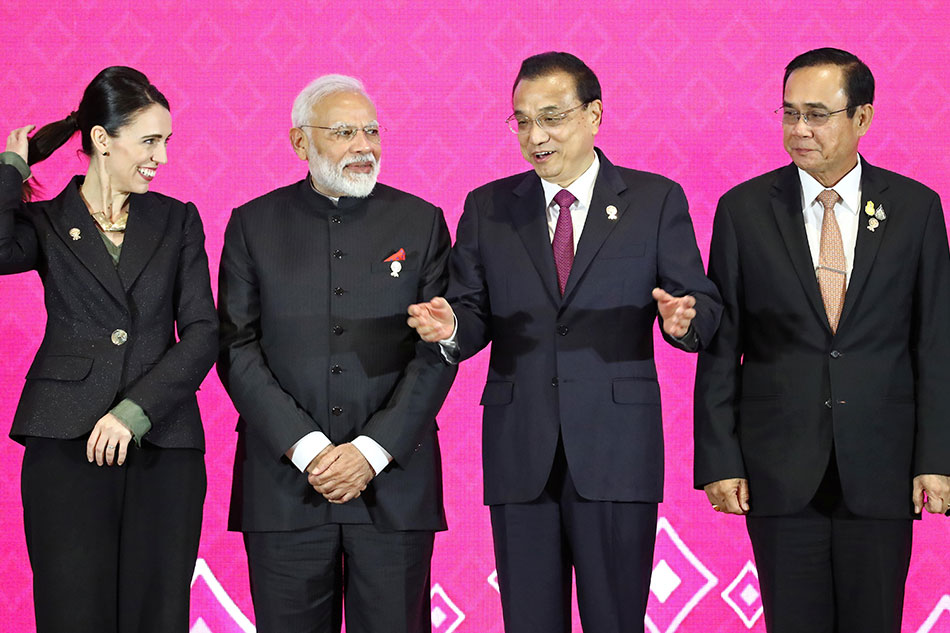RCEP effectively gives up year-end goal for free trade deal
ADVERTISEMENT

Welcome, Kapamilya! We use cookies to improve your browsing experience. Continuing to use this site means you agree to our use of cookies. Tell me more!
RCEP effectively gives up year-end goal for free trade deal
Kyodo News
Published Nov 04, 2019 09:40 PM PHT
|
Updated Nov 04, 2019 11:58 PM PHT
BANGKOK - Leaders from 16 Asia-Pacific nations including Japan, China and India have effectively given up on achieving the goal of finalizing their free trade deal by the end of this year, according to a joint statement issued Monday.
BANGKOK - Leaders from 16 Asia-Pacific nations including Japan, China and India have effectively given up on achieving the goal of finalizing their free trade deal by the end of this year, according to a joint statement issued Monday.
In the statement released after their summit in Thailand, the leaders of the Regional Comprehensive Economic Partnership pledged to sign an agreement on creating the world's largest free trade area in 2020, indicating the countries will continue their negotiations.
In the statement released after their summit in Thailand, the leaders of the Regional Comprehensive Economic Partnership pledged to sign an agreement on creating the world's largest free trade area in 2020, indicating the countries will continue their negotiations.
"We noted 15 RCEP Participating Countries have concluded text-based negotiations for all 20 chapters and essentially all their market access issues; and tasked legal scrubbing by them to commence for signing in 2020," the statement said.
"We noted 15 RCEP Participating Countries have concluded text-based negotiations for all 20 chapters and essentially all their market access issues; and tasked legal scrubbing by them to commence for signing in 2020," the statement said.
But "India has significant outstanding issues, which remain unsolved," it added, suggesting that the South Asian nation and other RCEP members failed to reach agreement in key fields such as tariffs.
But "India has significant outstanding issues, which remain unsolved," it added, suggesting that the South Asian nation and other RCEP members failed to reach agreement in key fields such as tariffs.
ADVERTISEMENT
India is believed to be reluctant to lower its trade barriers, as the country claims that it has suffered massive and chronic trade deficits with China for many years.
India is believed to be reluctant to lower its trade barriers, as the country claims that it has suffered massive and chronic trade deficits with China for many years.
If the free trade area -- which would cover half of the world's population -- is put into practice, trade and investment activities among RCEP nations would intensify on the back of measures like the elimination and reduction of tariffs.
If the free trade area -- which would cover half of the world's population -- is put into practice, trade and investment activities among RCEP nations would intensify on the back of measures like the elimination and reduction of tariffs.
In India, however, there is concern that the deal would result in an influx of cheap agricultural and industrial products including smartphones from China, further increasing the trade surplus of the world's second-biggest economy, sources said.
In India, however, there is concern that the deal would result in an influx of cheap agricultural and industrial products including smartphones from China, further increasing the trade surplus of the world's second-biggest economy, sources said.
Covering a third of the world economy, RCEP has a history of missed deadlines with varying degrees of ambition among the 16 members. Talks began in 2013 with the initial goal of wrapping them up in 2015.
Covering a third of the world economy, RCEP has a history of missed deadlines with varying degrees of ambition among the 16 members. Talks began in 2013 with the initial goal of wrapping them up in 2015.
RCEP brings together Australia, China, India, Japan, South Korea and New Zealand, as well as the ASEAN states -- Brunei, Cambodia, Indonesia, Laos, Malaysia, Myanmar, the Philippines, Singapore, Thailand and Vietnam.
RCEP brings together Australia, China, India, Japan, South Korea and New Zealand, as well as the ASEAN states -- Brunei, Cambodia, Indonesia, Laos, Malaysia, Myanmar, the Philippines, Singapore, Thailand and Vietnam.
ADVERTISEMENT
ADVERTISEMENT



